|
|
|
Sort Order |
|
|
|
Items / Page
|
|
|
|
|
|
|
| Srl | Item |
| 1 |
ID:
085436
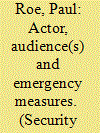

|
|
|
|
|
| Publication |
2008.
|
| Summary/Abstract |
The concept of securitization has produced a considerable amount of debate over the meaning of security. However, far less attention has been paid to the role of audiences and their relationship to actors in the securitization process. Informed by the work of Thierry Balzacq (2005), and through analysis of the decision of the UK government to join with the USA in the 2003 invasion of Iraq, in this article I show that although the general public can indeed play a valuable role in providing an actor with `moral' support concerning the `securityness' of an issue, more crucial, however, is the `formal' support provided by parliament concerning the `extraordinaryness' of the means necessary to deal with it. My argument is thus that securitization can in this way be seen as a distinct two-stage process marked by a `stage of identification' and a `stage of mobilization'
|
|
|
|
|
|
|
|
|
|
|
|
|
|
|
|
| 2 |
ID:
117350
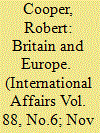

|
|
|
|
|
| Publication |
2012.
|
| Summary/Abstract |
In the period before Britain joined the European Economic Community in 1973 the founding Six set up agricultural and budgetary policies which worked to Britain's disadvantage and caused friction over a long time. After a lengthy battle to obtain a rebate on contributions to the EU budget, which came to a close with the Fontainebleau Agreement of 1984, the UK contributed to a more liberal, open Europe, especially with regard to the single market and trade and foreign policy. There were sporadic bursts of leadership, as exemplified by Margaret Thatcher's work to complete the single market and Tony Blair's on European security. Britain has been a successful and influential member of the EU, except in a few areas where it has showed reluctance or opted out, most notably treaty change and Economic and Monetary Union. In spite of this, and of the problems that lie ahead in these areas, the balance sheet on both sides is positive.
|
|
|
|
|
|
|
|
|
|
|
|
|
|
|
|
| 3 |
ID:
098220
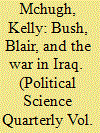

|
|
|
| 4 |
ID:
149647
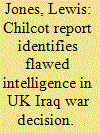

|
|
|
| 5 |
ID:
123041
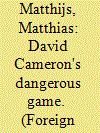

|
|
|
|
|
| Publication |
2013.
|
| Summary/Abstract |
Despite his innate caution and usually sound political instincts, British Prime Minister David Cameron is gambling with his country's future. In January, in a long-anticipated speech, he called for a wide-ranging renegotiation of the terms of the United Kingdom's membership in the European Union and promised to put the result up for a straight in-or-out popular referendum by the end of 2017 (assuming his party wins the next election, due in 2015). A British exit from the EU is now more likely than ever -- and it would be disastrous not only for the United Kingdom but also for the rest of Europe and the United States.
|
|
|
|
|
|
|
|
|
|
|
|
|
|
|
|
| 6 |
ID:
092399
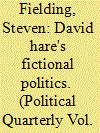

|
|
|
|
|
| Publication |
2009.
|
| Summary/Abstract |
David Hare is Britain's leading political dramatist. His Gethsemane premiered in November 2008, amidst anticipation that the play would 'crucify' New Labour. Gethsemane is in fact one of a number of fictionalisations of New Labour produced since 1997. These works have generally held up the party under Tony Blair's leadership to unmitigated criticism. Gethsemane certainly took Blair's premiership to task. However, despite increasing popular cynicism about Westminster politicians, Hare also suggested that politics remains a potential means through which honourable ends might still be achieved. However, already primed by the prevailing hostility to New Labour encouraged by earlier fictionalisations, few of those who reviewed Gethsemane noted Hare's tentative message of hope.
|
|
|
|
|
|
|
|
|
|
|
|
|
|
|
|
| 7 |
ID:
073548
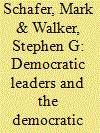

|
|
|
|
|
| Publication |
2006.
|
| Summary/Abstract |
Do the beliefs of leaders make a significant difference in determining if democracies are peaceful and explaining why democracies (almost) never fight one another? Our comparisons of Prime Minister Tony Blair and President Bill Clinton reveal that both leaders view democracies as more friendly than nondemocracies, and they have significantly less cooperative beliefs toward the latter than toward the former, a difference that extends to the behavior of their respective governments during the Kosovo conflict. We also find that individual differences in the operational codes of the two leaders matter in the management of conflict with nondemocracies; the leaders exhibit opposite leadership styles and behavior associated with the domestic political culture of the two states. Overall, these results support the dyadic version of the democratic peace and suggest that the conflict behavior of democratic states depends upon the beliefs and calculations of their leaders in dealing with nondemocracies.
|
|
|
|
|
|
|
|
|
|
|
|
|
|
|
|
| 8 |
ID:
094458
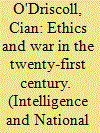

|
|
|
|
|
| Publication |
2010.
|
| Summary/Abstract |
The discipline of International Relations has a patchy record when it comes to accounting for change in world politics. It has tended to focus on continuity instead. A typical statement in this regard is Martin Wight's depiction of international affairs as a 'realm of recurrence and repetition', while Hans Morgenthau has drawn attention to its 'repetitive character'.
|
|
|
|
|
|
|
|
|
|
|
|
|
|
|
|
| 9 |
ID:
076402
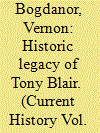

|
|
|
| 10 |
ID:
120454
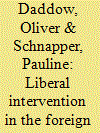

|
|
|
|
|
| Publication |
2013.
|
| Summary/Abstract |
David Cameron was a critic of Tony Blair's doctrine of the 'international community', which was used to justify war in Kosovo and more controversially in Iraq, suggesting caution in projecting military force abroad while in opposition. However, and in spite of making severe cuts to the defence budget, the Cameron-led Coalition government signed Britain up to a military intervention in Libya within a year of coming into office. What does this say about the place liberal interventionism occupies in contemporary British foreign policy? To answer this question, this article studies the nature of what we describe as the 'bounded liberal' tradition that has informed British foreign policy thinking since 1945, suggesting that it puts a distinctly UK national twist on conventional conservative thought about international affairs. Its components are: scepticism of grand schemes to remake the world; instinctive Atlanticism; security through collective endeavour; and anti-appeasement. We then compare and contrast the conditions for intervention set out by Tony Blair and David Cameron. We explain the similarities but crucially the vital differences between the two leaders' thinking on intervention, with particular reference to Cameron's perception that Downing Street needed to loosen its control over foreign policymaking after Iraq. Our argument is that policy substance, policy style and party political dilemmas prompted the two leaders to reconnect British foreign policy with its ethical roots, ingraining a bounded liberal posture in British foreign policy after the moral bankruptcy of the John Major years. This return to a pragmatic and ethically informed foreign policy meant that military operations in Kosovo and Libya were undertaken in quite different circumstances, yet came to be justified by similar arguments from the two leaders.
|
|
|
|
|
|
|
|
|
|
|
|
|
|
|
|
| 11 |
ID:
149224
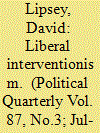

|
|
|
|
|
| Summary/Abstract |
David Lipsey analyses the arguments made by former Labour prime minister Tony Blair in his Chicago speeches for armed liberal intervention in states which are abusing the human rights of their citizens. He traces these arguments back to previous advocates of such intervention such as W. E. Gladstone and Woodrow Wilson. The arguments of Blair and advocates are often compelling in principle. However, in most cases—Iraq and Libya are examples—the practical consequences of military action turn out to be disastrous. Though opposing pacifism, and the ill-thought-out hostility to all things military of Labour's current leader Jeremy Corbyn, Lipsey's advice to those thinking of intervening is: don't.
|
|
|
|
|
|
|
|
|
|
|
|
|
|
|
|
| 12 |
ID:
097836
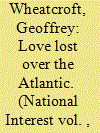

|
|
|
|
|
| Publication |
2010.
|
| Summary/Abstract |
IN MARCH 2001, the once youthful but now veteran Tory politician William Hague gave a speech at a Conservative Party conference in which he banged the anti-European drum. In March 2003, he gave another speech, in Parliament, in which he warmly endorsed Tony Blair's support for the American invasion of Iraq. In July 2010, he spoke once more, this time in the celebrated Locarno Room at the Foreign Office. But his tune had changed: like Prime Minister David Cameron, now-Foreign Secretary Hague has intimated that he seeks to distance Britain from reflexive support for Washington, and he says that, in a new multipolar world, he wants to move more generally from an obsession with the "blocs"-the United States, Europe and the Middle East-to forge fresh links with such emerging powerhouses as India, China and Brazil.
|
|
|
|
|
|
|
|
|
|
|
|
|
|
|
|
| 13 |
ID:
094678
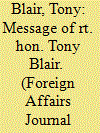

|
|
|
| 14 |
ID:
126192
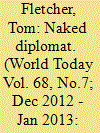

|
|
|
| 15 |
ID:
086948
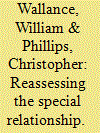

|
|
|
|
|
| Publication |
2009.
|
| Summary/Abstract |
The resignation of Tony Blair as British Prime Minister and the transition from Bush to Obama in the US mark the end of the second revival of the US-UK special relationship. The classic era of the special relationship began under the Labour government in the 1940s, though it was Winston Churchill who inspired the concept. It ended with the resignation of Harold Macmillan in 1963. Margaret Thatcher revived close personal relations with the US President as a guiding principle of UK foreign policy and Tony Blair successfully revived them again, even though the end of the Cold War had transformed the framework of transatlantic relations. Over the past 60 years US-UK relations have embedded specific security arrangements which have persisted, largely unquestioned, through the ups and downs of political relations at the top: close links between the two countries' armed forces; access to defence technology and procurement; intelligence ties through the UKUSA Agreement; a semi-independent nuclear deterrent and provision of military bases in the UK and its overseas territories. Public debate on the costs and benefits of these links has been limited; successive governments have discouraged a wider debate. The Obama administration enters office with few of the personal ties to Britain and to English culture, which have underpinned the special relationship. Earlier US administrations have approached relations with the UK from the perspective of US interests, while many British political leaders have felt-and have hoped to find in Washington-a sentimental attachment to Anglo-American partnership. British foreign policy would benefit from a reassessment of the structures of US-UK relations in terms of British interests, costs and benefits.
|
|
|
|
|
|
|
|
|
|
|
|
|
|
|
|
| 16 |
ID:
117799
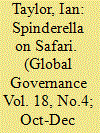

|
|
|
|
|
| Publication |
2012.
|
| Summary/Abstract |
Under New Labour, the British government was claimed to be operating under guidelines that sought to have an ethical dimension to British foreign policy. A particular focus of New Labour's foreign policy, rhetorically at least, was Africa. During this period, London sought to bring the G8 in line with London's claimed policies vis-à-vis the continent. However, upon closer analysis, vocal flourishes and presentations aside, policy was never adequately supported by, and in many respects was contradicted by, much of what Blair's government actually did in relation to Africa. The disparity between the high-profile media presentation of policy and what was actually delivered by Blair and company in Africa reflected a wider problem in the British polity that New Labour and its spin doctors came to symbolize.
|
|
|
|
|
|
|
|
|
|
|
|
|
|
|
|
| 17 |
ID:
133384


|
|
|
|
|
| Publication |
2014.
|
| Summary/Abstract |
In 1998, the British government led by Prime Minister Tony Blair released the Strategic Defence Review (SDR), in which it identified a requirement for twelve state-of-the-art warships for the Royal Navy (RN) to be configured for antiair warfare.1 This new naval platform was conceived as a replacement for the Type 42 destroyers, which had first entered service in 1978; its development was initially associated with the Anglo-French-Italian Horizon project that had replaced the NATO Frigate Replacement, from which Britain withdrew in 1989. That vision, however, had a very short shelf life. Some months after the SDR's release, Britain withdrew from the Horizon project and launched an indigenous Type 45 destroyer program.
|
|
|
|
|
|
|
|
|
|
|
|
|
|
|
|
| 18 |
ID:
174011
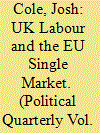

|
|
|
|
|
| Summary/Abstract |
This article looks at the UK Labour Party’s view of the EU single market over the last four decades, focussing on three case study periods when this issue was particularly salient: first, the time of the single market’s introduction under Neil Kinnock’s leadership; second, the A8 accession with Tony Blair as Labour Prime Minister; and third, between the 2016 European referendum and 2019 general election during Jeremy Corbyn’s time as party leader. This historical narrative uses the theoretical approach of Harvard economist Dani Rodrik—of a ‘trilemma’ faced by national policy makers in response to globalisation—as a lens to describe a clear arc in Labour’s policy towards the single market across the three case studies. A position of initial scepticism moved to support under Kinnock’s leadership, and then active encouragement under Blair, before coming back again under Corbyn to uncomfortable non‐commitment. This arc directly correlates with the ebb and flow of the party’s overall economic approach—first the Keynesian, national Alternative Economic Strategy at the time of the party’s 1983 general election defeat; then, the deviation under Blair to a policy that actively encouraged cross‐border market liberalisation; and finally the return to an Alternative Economic Strategy‐style approach under Corbyn.
|
|
|
|
|
|
|
|
|
|
|
|
|
|
|
|
| 19 |
ID:
122472
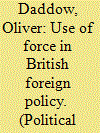

|
|
|
|
|
| Publication |
2013.
|
| Summary/Abstract |
This article studies the ideational underpinnings of the UK Coalition government's 'liberal conservative' foreign policy. It begins by suggesting that an Iraq-centric account of Blair's foreign policy suggests a grand vision on the prime minister's part that was lacking from his earlier foreign policy adventures, which relied on a more conventional form of British statecraft. The second section contends that the Gordon Brown years 2007-10 and, since the end of New Labour, Coalition foreign policy, can be seen as a response both to the substance and style of Blair's highly personalised stewardship of foreign policy post-9/11. The war on terror and the invasion of Iraq were accompanied by a seemingly open-ended democracy promotion around the globe which was quite out of character with past British practice. The article argues, therefore, that under Brown and Cameron cautious pragmatism has tended to win out over the proclamation of grand strategic ambition.
|
|
|
|
|
|
|
|
|
|
|
|
|
|
|
|
| 20 |
ID:
109522
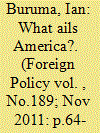

|
|
|
|
|
|
|
|